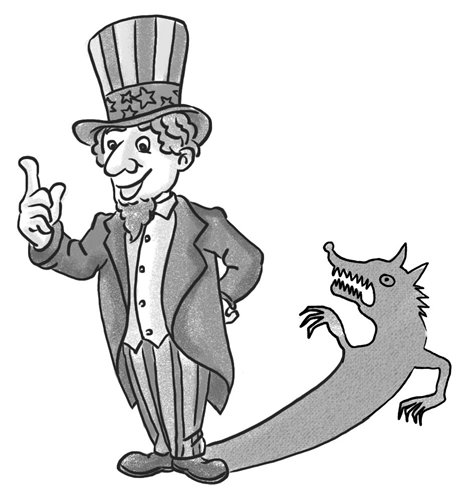HOME >> BUSINESS
US, a manipulator of law, will be disappointed
By Gu Bin Source:Global Times Published: 2019/8/18 18:13:39

Illustration: Xia Qing/GT
On August 5, the US Department of the Treasury designated China as a currency manipulator. The decision amounted to an escalation of the trade war into a currency war, in the name of responding to China's yuan depreciation, which had broken the milestone point of 7 to the US dollar earlier that day.
US President Donald Trump would not tolerate the yuan depreciation, because the depreciation has an economic effect of offsetting US tariff increases. Trump had earlier threatened to levy tariffs of 10 percent on the remaining $300 billion of Chinese goods, starting September.
The People's Bank of China (PBC), the country's central bank, said that the currency move reflects shifts in market dynamics and volatilities in global foreign exchange markets amid global economic developments and escalating trade frictions. It was, therefore, a market move in anticipation of the additional tariffs.
It is Trump that brought down the yuan value, by fighting his tariff war and making the world economy look gloomy. But he chose to blame China for "currency manipulation."
In fact, since March 2018 when Trump first initiated the tariff war, the yuan has depreciated from less than 6.3 to 7 to the US dollar. Each time the China-US negotiations appeared favorable to the market, the yuan went up, but when the negotiations halted and Trump weaponized the tariffs, the market felt the pinch and the yuan would go down.
It is evident that the yuan to US dollar exchange rate volatility reflects more of a typical "defensive depreciation" driven by market forces, rather than the alleged "competitive devaluation" advanced by China in order to gain an export edge.
Factoring in the trade frictions and global economic prospects, many currencies have depreciated against the US dollar since the start of August. It is not a phenomenon unique to the yuan, as PBC Governor Yi Gang explained in a press release. The PBC emphasized that the yuan remains the strongest among the G20 economies, appreciating 47 percent in real terms during the past 15 years.
Yi explicitly defended China's loyalty to the G20 consensus against "competitive devaluations," amid US Treasury accusations that the PBC "has extensive experience of manipulating its currency and remains prepared to do so on an ongoing basis."
The IMF basically requires two elements for proving currency manipulation: Objectively, a fundamental exchange rate misalignment must exist; and subjectively, such a misalignment must serve the purpose of gaining trade advantages. The US bluntly labeled China as a currency manipulator, without even bothering to refer to the established standards.
For the US, this is another outright violation of international rules, let alone its repetitive violations of WTO tariff commitments.
History shows that the US has never hesitated to pursue "America First" at the expense of international law. The US Congress used to propose various bills, including using antidumping or countervailing measures, to counter Chinese exports based on alleged currency manipulation. But it is clear that such bills, if passed into law, would be in violation of international rules.
The US Treasury's designation is even inconsistent with US domestic law. There are three criteria for establishing currency manipulation: a significant bilateral trade surplus (at least $20 billion); a material current account surplus (at least 2 percent of GDP); and persistent one-sided intervention in the forex market (net purchase of foreign currency of no less than 2 percent of an economy's GDP over a period of 12 months).
The Treasury's designation was arbitrary, given the sound evidence contrary to its claims, according to an IMF report released on August 9, shortly after the designation. It also contradicted the Treasury's own conclusion in a May 2019 report. For example, China's current account surplus was just 0.4 percent of GDP last year and will be 0.5 percent in 2019, far below the designated threshold; and on forex intervention, China did not meet the threshold either.
What comes next after the designation? US law directs its executive director in the IMF to call for "additional rigorous surveillance of the macroeconomic and exchange rate policies" of China and perhaps "formal consultations on findings of currency manipulation," among other things. The Treasury vowed to urge the IMF "to eliminate the unfair competitive advantage created by China's latest actions."
The US will effectively try to push the IMF to endorse its decision, which would be difficult as the IMF has just concluded in its Article IV consultation that the yuan is broadly in line with fundamentals, and is "not significantly overvalued or undervalued."
Nowadays, the IMF is not a puppet of the US Treasury any more. It is almost certain that Trump will be disappointed, and he may then threaten to withdraw from the organization. Nothing is impossible for Trump.
The author is an associate law professor at Beijing Foreign Studies University, and author of The Law and Governance of the Asian Infrastructure Investment Bank. bizopinion@globaltimes.com.cn
Posted in: INSIDER'S EYE